Natural Remedies for Stomach Ache Relief
Stomach aches, or abdominal pain, can strike unexpectedly and range from mildly uncomfortable to excruciating. The good news is that many effective natural remedies for stomach ache relief exist, embracing the healing power of herbs and holistic approaches.

Disclaimer: Information and statements shown here are for educational and informational purposes only and are not to replace the advice of your healthcare professional.
This post may include affiliate links. Please refer to our disclaimer for full disclosure.
In this comprehensive guide, we'll explore various methods to ease stomach discomfort, from ancient herbal wisdom to effective home remedies.
From ginger's comforting warmth to chamomile's calming effects, and from herbal teas to specialized diets like BRAT, we'll cover a wide spectrum of remedies. You'll also learn how to identify trigger foods and discover stress reduction techniques that can work in harmony with herbal remedies.
We'll consider different age groups, understanding that what works for children may not be the same as what's suitable for the elderly. For pregnant individuals, we'll go over safe herbal options but stress the importance of consulting a healthcare provider.

As you navigate through this guide, remember that your stomach is unique, and you can choose remedies that best fit your needs.
So, let's dive into the world of natural remedies, from ancient wisdom to modern holistic solutions, and discover how you can nurture your digestive well-being for a happier and healthier you.
Understanding Stomach Aches
Stomach aches can result from a myriad of causes, including spicy foods, irritable bowel syndrome (IBS), acid reflux, and food poisoning. Understanding the source of your discomfort is the first step to finding relief.
It's crucial to recognize the symptoms of an upset stomach, such as abdominal pain and bloating, to address the issue effectively.
The Power of Natural Remedies
Before diving into specific remedies, let's explore the benefits of natural solutions. These remedies often have minimal to no side effects, unlike over-the-counter medications, making them a safer and healthier option for alleviating stomach discomfort.
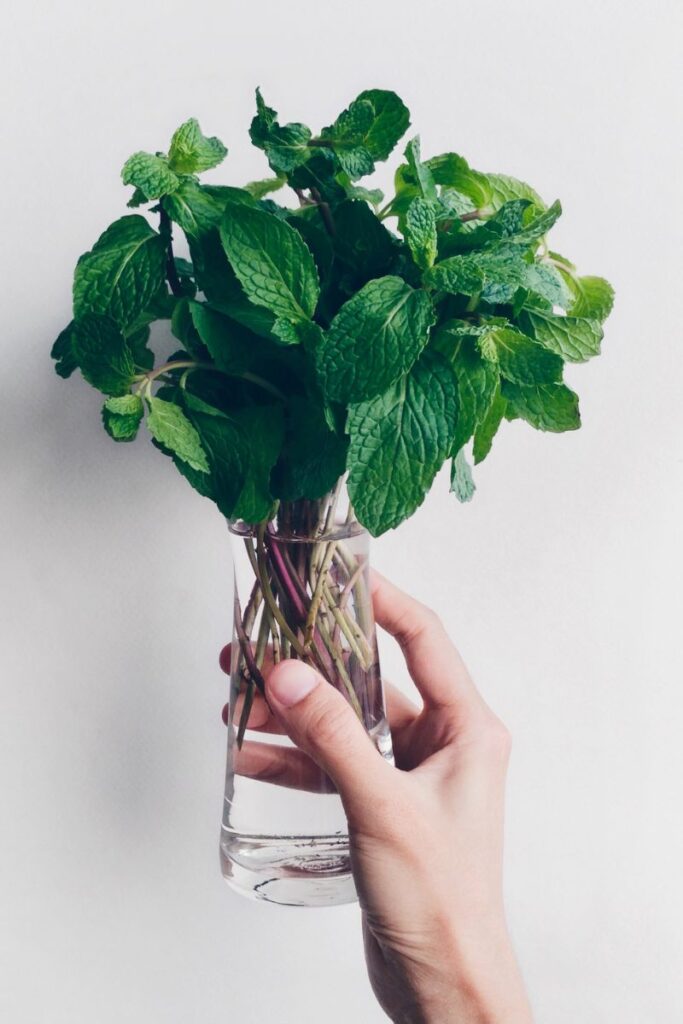
Nature provides us with a plethora of tools to nurture our digestive well-being.
Top 4 Herbs and Spices for Soothing Stomach Aches
Ginger: Nature's Digestive Aid
- Ginger, with its anti-inflammatory properties, is a powerful natural remedy for stomach aches. Whether you choose ginger tea, fresh ginger root, or ginger ale, its ability to calm stomach contractions and relieve nausea is remarkable.
Peppermint: Cooling and Calming
- Peppermint tea, infused with the cooling essence of mint, can alleviate gas pain, reduce stomach cramps, and support digestion. Peppermint oil capsules are another effective option.
Chamomile: Gentle Healer
- Chamomile tea, renowned for its calming properties, can ease muscle spasms, soothe stomach muscles, and reduce tension. It's a gentle yet effective remedy for digestive discomfort.
Fennel Seeds: Bloating Buster
- Fennel seeds and fennel tea are excellent choices for reducing bloating and aiding digestion. Their natural properties can help alleviate symptoms of an upset stomach.
DIY Herbal Teas for Stomach Relief
When it comes to soothing stomach discomfort, herbal teas can be your best friend. Let's explore how to prepare and use these DIY herbal teas to their full potential for maximum effectiveness.
Ginger Tea Recipe
Here's how to make a soothing ginger tea at home. It's a quick and easy remedy for stomach aches.
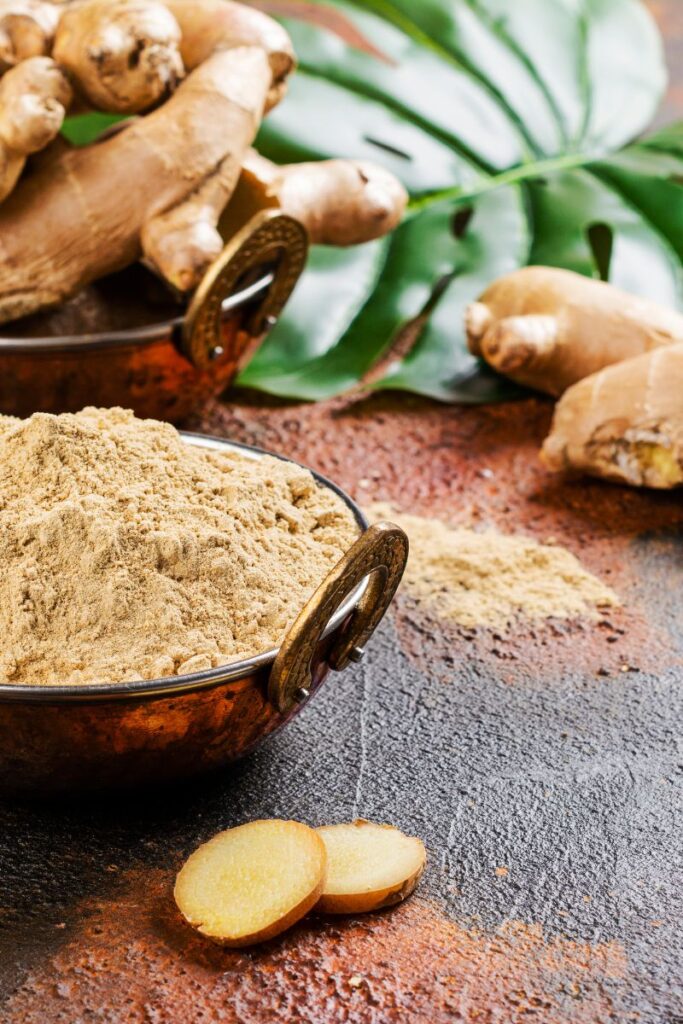
Ingredients:
- Fresh ginger root (about 1 inch) or dried loose ginger
- 1 cup of water
- 1-2 teaspoons of honey (optional)
Instructions:
- Start by washing and peeling the ginger root.
- Slice it into thin, small pieces or grate it for more flavor extraction.
- In a saucepan, bring one cup of water to a boil.
- Add the ginger slices or grated ginger to the boiling water.
- Reduce the heat to low, cover the saucepan, and let it simmer for about 10-15 minutes.
- Remove it from the heat and strain the tea into a cup.
- If desired, add 1-2 teaspoons of honey for a touch of sweetness and additional soothing benefits.
- Sip the ginger tea slowly, allowing its warmth and anti-inflammatory properties to calm your stomach.
Tips for Maximum Effectiveness:
- Use fresh ginger for the best results; it contains higher levels of active compounds.
- Adjust the ginger quantity to your taste; more ginger can make the tea spicier and more potent.
- Honey is optional but can provide added relief, especially if you prefer a sweeter taste.
- Sip the ginger tea slowly for gradual relief, and don't hesitate to have another cup if needed.
Peppermint Infusion
Learn how to create a peppermint infusion for fast relief from gas pain and cramps.
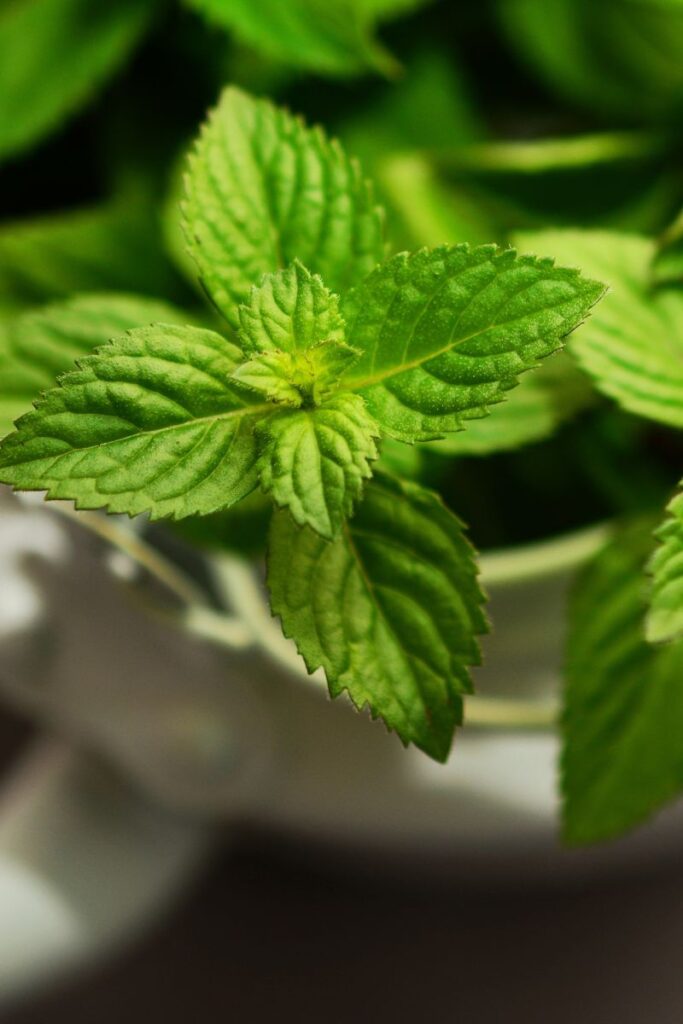
Ingredients:
- Peppermint tea bag or 1-2 teaspoons of dried peppermint leaves
- 1 cup of boiling water
- 1-2 teaspoons of honey (optional)
Instructions:
- Place a peppermint tea bag or dried peppermint leaves in a cup.
- Pour one cup of boiling water over the tea bag or leaves.
- Cover the cup and let it steep for 5-10 minutes.
- Remove the tea bag or strain the liquid if using loose leaves.
- If desired, add 1-2 teaspoons of honey for sweetness and additional relief.
- Sip the peppermint infusion slowly to ease gas pain and reduce cramps.
Tips for Maximum Effectiveness:
- Peppermint tea bags are convenient, but using dried peppermint leaves can provide a stronger flavor.
- Steep the tea for a shorter duration (around 5 minutes) for a milder taste or longer (up to 10 minutes) for a stronger peppermint flavor.
- Honey can enhance the taste and soothing properties of the infusion.
- Sip the tea while it's still warm to reap its benefits fully.
Chamomile Soothing Brew
Discover the recipe for a comforting chamomile brew to calm muscle spasms and promote relaxation.

Ingredients:
- 1 chamomile tea bag or 1-2 teaspoons of dried chamomile flowers
- 1 cup of boiling water
- 1-2 teaspoons of honey (optional)
Instructions:
- Place a chamomile tea bag or dried chamomile flowers in a cup.
- Pour one cup of boiling water over the tea bag or flowers.
- Cover the cup and allow it to steep for 5-10 minutes.
- Remove the tea bag or strain the liquid if using dried flowers.
- Optionally, add 1-2 teaspoons of honey for a touch of sweetness and added soothing effects.
- Sip the chamomile brew slowly to calm muscle spasms and promote relaxation.
Tips for Maximum Effectiveness:
- Chamomile tea bags are readily available, but using dried chamomile flowers can offer a more robust chamomile aroma.
- Adjust the steeping time to your preference; longer steeping yields a stronger flavor.
- Honey can complement the chamomile's natural sweetness and enhance its soothing properties.
- Savor the warmth of the chamomile brew slowly for the most relaxation and relief.
Fennel Seed Infusion
Incorporate the benefits of fennel seeds, known for its ability to reduce gas and bloating
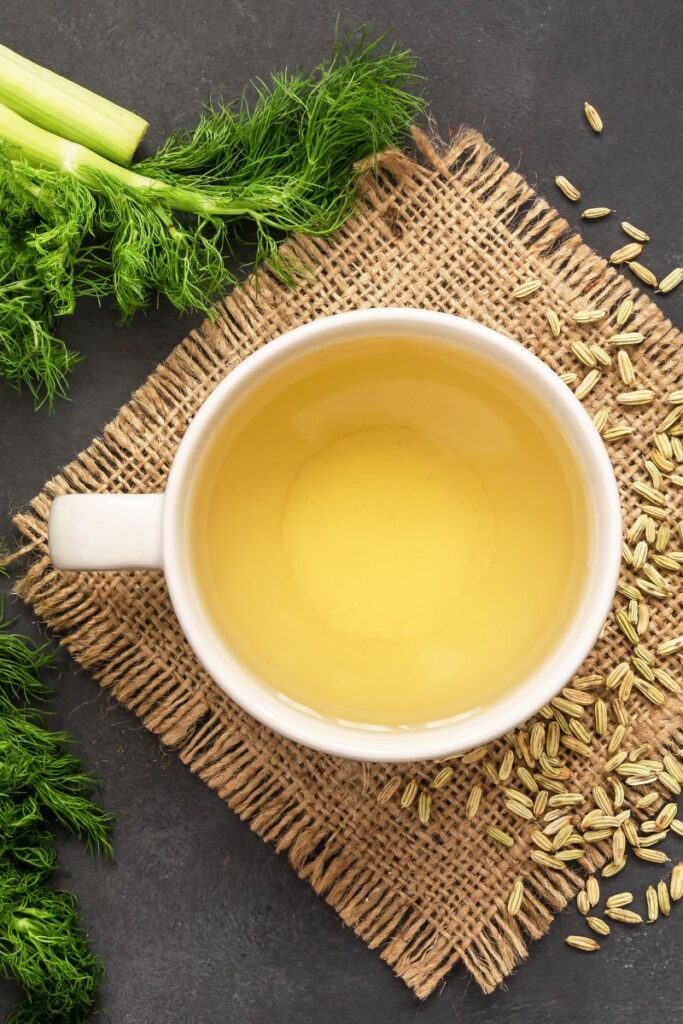
Ingredients:
- 1-2 teaspoons of fennel seeds
- 1 cup of boiling water
Instructions:
- Place the fennel seeds in a cup.
- Pour one cup of boiling water over the fennel seeds.
- Cover the cup and let it steep for 10-15 minutes.
- Strain the liquid to remove the fennel seeds.
- Sip the fennel seed tea slowly to ease bloating and aid digestion.
Tips for Maximum Effectiveness:
- Crush the fennel seeds slightly before steeping to release their natural oils and flavors.
- Fennel seed tea is known for its ability to reduce gas and bloating, making it an excellent choice for digestive comfort.
- Enjoy the tea warm for optimal relaxation and relief.
Quick Fixes for Immediate Relief
Applying an herbal compress can be a soothing and effective way to ease stomach discomfort. This technique involves using a heating pad or a hot water bottle infused with herbs to provide immediate relief by relaxing stomach muscles and reducing muscle spasms. Let's explore how to create herbal compresses for stomach ache relief.
Creating Herbal Compresses
Ginger and Peppermint Compress:
- Crush fresh ginger and peppermint leaves to release their natural oils.
- Place the crushed herbs in a small cloth bag or wrap them in a clean, thin cloth.
- Heat a hot water bottle or a microwave-safe heating pad.
- Place the herbal pouch on the heated surface, allowing it to absorb the warmth.
- Test the temperature to ensure it's comfortably warm, not too hot.
- Apply the herbal compress to your stomach and gently press it against the area of discomfort.
- Relax and allow the soothing warmth and herbal aroma to work its magic. You can leave it in place for about 15-20 minutes.
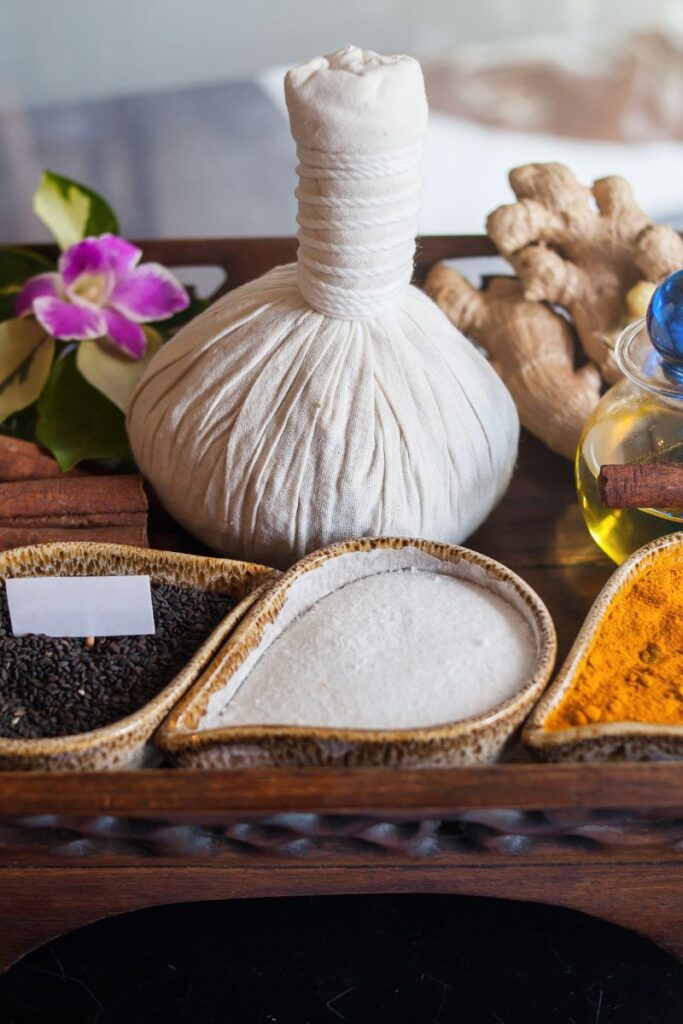
Chamomile and Lavender Compress:
- Combine dried chamomile flowers and lavender buds in a small cloth bag or cloth square.
- Heat your hot water bottle or heating pad as mentioned earlier.
- Place the herbal pouch on the warm surface to activate the herbs.
- Check the temperature to make sure it's comfortably warm.
- Apply the compress to your stomach, and let the calming scents of chamomile and lavender ease your discomfort.
- Relax for about 15-20 minutes, allowing the herbs to work their soothing magic.
Herbal Compress Benefits:
- Muscle Relaxation: The warmth from the herbal compress relaxes the muscles in your abdomen, reducing muscle spasms and cramps associated with stomach aches.
- Herbal Aromatherapy: The aromatic herbs provide a calming and comforting sensory experience, helping to alleviate stress and tension, which can contribute to stomach discomfort.
- Improved Blood Circulation: The warmth from the compress can enhance blood circulation to the area, promoting healing and relieving pain.
- Holistic Relaxation: Herbal compresses offer a holistic approach to relief, combining the therapeutic benefits of warmth and herbs for a comprehensive solution to stomach discomfort.
Over-the-Counter Herbal Remedies
- Explore over-the-counter herbal remedies like ginger chews and probiotic supplements, which can provide quick relief for common stomach issues.
- Ginger Chews
- Ginger chews are convenient and tasty options for soothing stomach discomfort. They contain natural ginger extract known for its anti-nausea and digestive benefits. Brands like "The Ginger People" offer a variety of ginger chews that can be found on Amazon.
2. Peppermint Oil Capsules:
- Peppermint oil capsules are a concentrated form of peppermint, which can help relieve gas, bloating, and indigestion. Look for reputable brands like "Heather's Tummy Tamers" for peppermint oil capsules available on Amazon.
3. Activated Charcoal Capsules
- Activated charcoal can help absorb gas and toxins in the digestive tract, offering relief from bloating and indigestion.
Herbal Supplements for Long-Term Digestive Health
Probiotic Supplements
- Probiotic supplements can enhance the balance of beneficial bacteria in your GI tract, aiding in long-term digestive health.
Digestive Enzymes
- Discover how digestive enzyme supplements can assist your body in breaking down food, preventing gas, and bloating.
Food Guidelines For Chronic Stomach Pains
When your stomach is in distress, choosing the right foods can make a significant difference in your comfort and recovery. Let's explore some specific dietary options that harness the healing power of food to calm an upset stomach.
BRAT Diet: Bananas, Rice, Applesauce, Toast
The BRAT diet has been a trusted ally in soothing the digestive tract during stomach upsets for generations. Here's a closer look at these gentle, easily digestible foods:
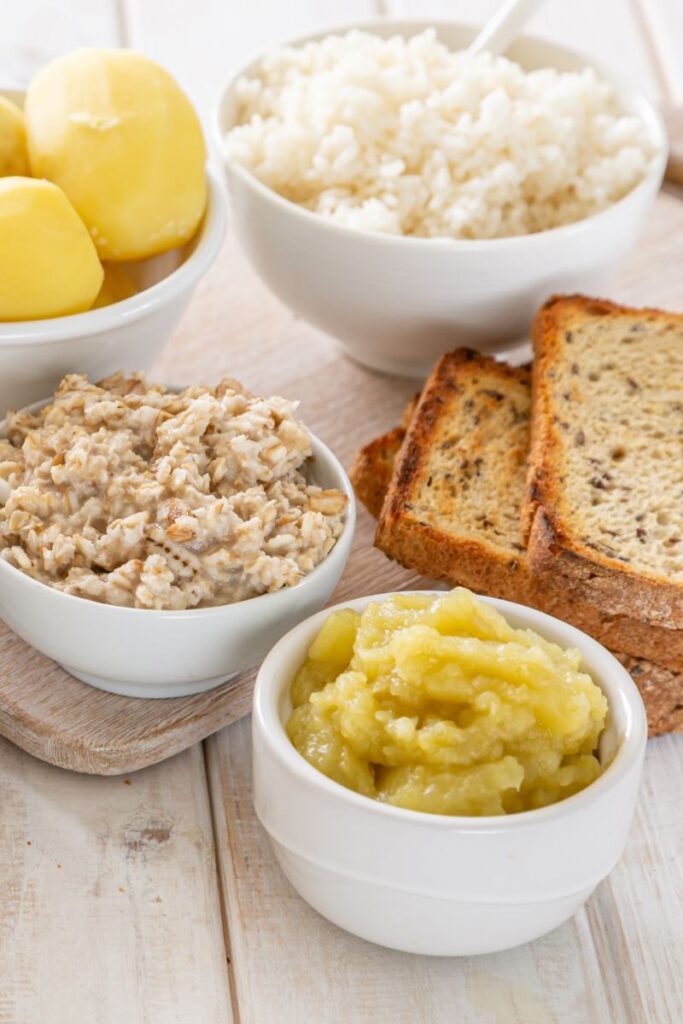
- Bananas: Rich in potassium and easy to digest, bananas help replenish lost nutrients due to vomiting or diarrhea. They also provide a soothing effect on the stomach lining.
- Rice: Plain white rice serves as a bland source of carbohydrates, helping to bind stool and reduce diarrhea. It's easy on the stomach and can provide essential energy when you're feeling weak.
- Applesauce: Unsweetened applesauce offers a gentle source of fiber and natural sugars. It helps bulk up stool and ease digestion while providing a touch of natural sweetness.
- Toast: Plain toast, preferably whole wheat or white, can settle your stomach without introducing strong flavors or spices. It's a source of carbohydrates that's easy to tolerate.
Probiotic-Rich Foods for Gut Health
A healthy gut is crucial for overall well-being, and probiotics play a significant role in maintaining a balanced gut microbiome. Consider incorporating these probiotic-rich foods into your diet:
- Yogurt: Opt for plain, unsweetened yogurt with live active cultures. Yogurt is a fantastic source of probiotics that can help restore the balance of beneficial bacteria in your gut.
- Kefir: Kefir is a fermented dairy product similar to yogurt but thinner in consistency. It's packed with probiotics and can be consumed as a drink or added to smoothies.
- Kimchi: This Korean fermented cabbage dish is teeming with probiotics and offers a tangy, spicy flavor that can be an acquired taste but is excellent for gut health.
- Sauerkraut: Fermented cabbage, sauerkraut is not only a probiotic powerhouse but also a source of dietary fiber that supports digestion.
- Kombucha: A fizzy, fermented tea, kombucha contains live probiotics and can be a refreshing way to support your digestive system.
Soups and Broths: Easy on the Stomach
Warm soups and broths are gentle on the stomach and provide much-needed nourishment, especially when you're not feeling your best. Here's why they can be beneficial:

- Easy Digestibility: Soups and broths are liquid-based and therefore require minimal effort from your digestive system. This makes them an ideal choice when your stomach is sensitive.
- Hydration: The high water content in soups and broths helps keep you hydrated, which is essential for recovery.
- Nutrient-Rich: Depending on the ingredients, soups can provide a range of nutrients, including vitamins, minerals, and protein.
- Comforting: The warmth of a soothing broth can have a comforting and calming effect when you're not feeling well.
Consider options like chicken soup, vegetable broth, or even a simple miso soup. Just be mindful of the ingredients and avoid overly spicy or rich soups that might irritate your stomach further. Opt for mild and easy-to-digest choices to promote comfort and recovery.
Recipes for Stomach-Friendly Meals
Tummy-Soothing Herbal Smoothie
- Whip up a tummy-soothing herbal smoothie to provide your body with nourishment and relief.

Ingredients:
- 1 ripe banana
- 1/2 cup plain yogurt (or dairy-free alternative)
- 1/2 cup fresh papaya chunks
- 1/2 cup fresh pineapple chunks
- 1 tablespoon fresh ginger root (peeled and grated)
- 1 tablespoon fresh mint (optional)
- 1 teaspoon honey (optional)
- 1/2 cup chamomile tea (cooled)
Instructions:
- Start by brewing a cup of chamomile tea and allowing it to cool.
- In a blender, combine the ripe banana, plain yogurt, fresh papaya chunks, fresh pineapple chunks, grated fresh ginger root, and fresh mint.
- Add the cooled chamomile tea to the blender to provide soothing properties to the smoothie.
- If desired, add a teaspoon of honey for sweetness and additional comfort.
- Blend all the ingredients until you achieve a smooth, creamy consistency.
- Pour the tummy-soothing herbal smoothie into a glass and sip slowly.
Tips for Maximum Effectiveness:
- Use ripe fruits, as they are generally easier to digest and sweeter.
- Fresh ginger provides a gentle warmth and mint can help reduce nausea.
- The chamomile tea adds a calming effect to the smoothie.
- Adjust the honey to your taste preference for added sweetness.
Herbal Rice Congee
- Explore how to prepare a herbal rice congee, a gentle and comforting dish for an upset stomach.
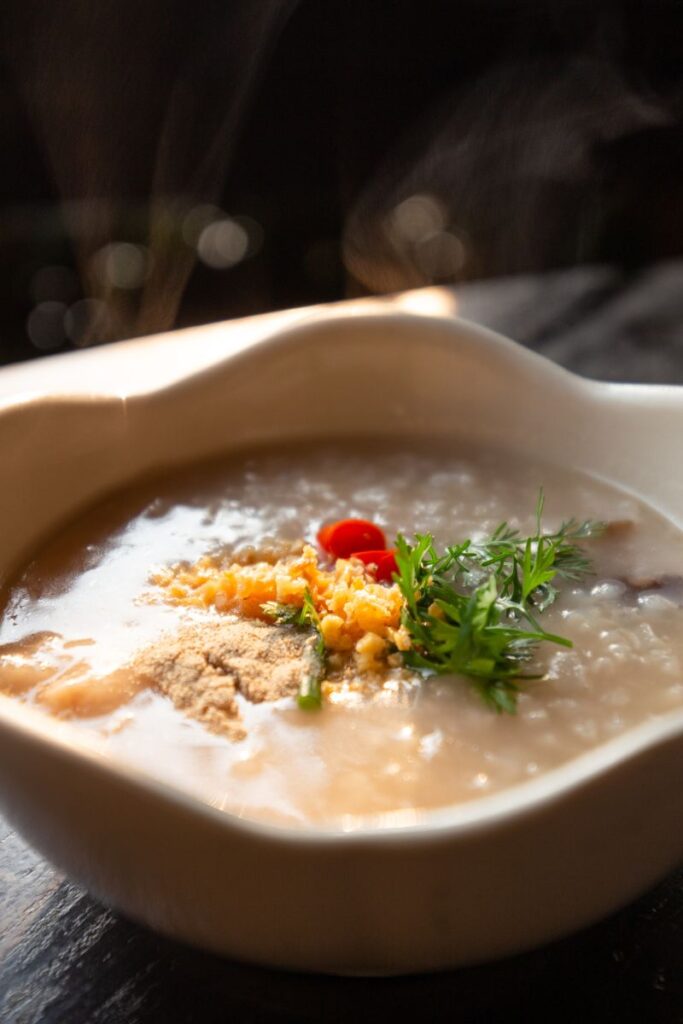
Ingredients:
- 1/2 cup white rice (rinsed)
- 6 cups water
- 1-inch piece of fresh ginger (sliced)
- 1-2 cloves garlic (minced)
- 1/2 cup shredded chicken or tofu (optional)
- 2-3 shiitake mushrooms (sliced)
- 1/4 cup chopped scallions
- Salt and pepper to taste
- A dash of sesame oil
- Fresh cilantro for garnish (optional)
Instructions:
- Rinse the white rice thoroughly under cold water until the water runs clear.
- In a large pot, combine the rinsed rice and water. Add the sliced fresh ginger and minced garlic.
- Bring the mixture to a boil, then reduce the heat to low and let it simmer, covered, for about 45 minutes to 1 hour, or until the rice has broken down and the congee thickens. Stir occasionally to prevent sticking.
- If using, add shredded chicken or tofu and shiitake mushrooms to the pot and continue simmering until they are cooked through.
- Season the congee with salt, pepper, and a dash of sesame oil to taste.
- Serve hot, garnished with chopped scallions and fresh cilantro if desired.
Tips for Maximum Effectiveness:
- Congee can be modified with your preferred ingredients; for an upset stomach, it's best to keep it simple.
- Ginger and garlic provide flavor and digestive benefits.
- Use low-sodium broth instead of water for added flavor, but be mindful of salt content if your stomach is sensitive.
- Adjust the consistency by adding more water if needed.
Both of these recipes are gentle on the stomach and provide nourishment and relief, making them excellent choices when you're experiencing digestive discomfort.
Avoiding Trigger Foods To Reduce Stomach Aches
One of the key strategies in managing stomach discomfort and maintaining digestive well-being is to identify and avoid trigger foods. These are foods that have the potential to exacerbate digestive issues, especially if you have specific sensitivities or conditions such as lactose intolerance or irritable bowel syndrome (IBS). Let's delve into the process of identifying these triggers and explore a list of foods that are best avoided to ensure a happier, healthier stomach.
Identifying Your Food Triggers
Identifying your food triggers is a critical step in managing stomach discomfort effectively. It involves paying close attention to your body's responses after eating specific foods and keeping a food journal to track any patterns. Here's how you can start:
- Keep a Food Journal: Begin by maintaining a food diary. Record everything you eat and drink, including portion sizes and meal times. Additionally, note any symptoms or discomfort you experience after eating.
- Be Observant: Pay attention to how your body reacts to different foods. Do you notice bloating, gas, cramps, diarrhea, or other digestive issues after consuming certain items?
- Experiment with Elimination: If you suspect a particular food or ingredient is causing discomfort, consider eliminating it from your diet for a while. Monitor whether your symptoms improve during this period.
- Reintroduce Foods: After a period of elimination, reintroduce the food gradually to observe if it triggers any digestive problems. This step can help confirm whether a specific food is a trigger for you.
- Consult a Healthcare Provider: If you're struggling to identify your food triggers or experiencing severe symptoms, consult with a healthcare provider or a registered dietitian. They can provide guidance and perform tests to pinpoint specific sensitivities or allergies.
Foods to Steer Clear Of
While trigger foods can vary significantly from person to person, certain items tend to be common culprits when it comes to stomach problems. Here are some foods that many individuals find best to avoid to prevent stomach discomfort:
- Dairy Products: If you're lactose intolerant, dairy products like milk, cheese, and ice cream can lead to gas, bloating, and diarrhea. Opt for lactose-free alternatives or dairy substitutes.
- Spicy Foods: Spicy foods can irritate the stomach lining and exacerbate conditions like acid reflux or gastritis. Reduce or eliminate spicy dishes if you're prone to digestive issues.
- Fatty Foods: High-fat foods, such as fried items and greasy fast food, can slow down digestion and contribute to heartburn or indigestion. Opt for lighter, less greasy options.
- Carbonated Drinks: Carbonated beverages, including sodas and sparkling water, can introduce excess gas into the digestive system, potentially causing bloating and discomfort.
- Processed Foods: Processed and heavily processed foods often contain additives, preservatives, and artificial ingredients that may trigger digestive problems in some individuals. Opt for whole, natural foods whenever possible.
- High-Fiber Foods: While fiber is generally beneficial for digestion, consuming excessive amounts of high-fiber foods, especially if you're not accustomed to them, can lead to gas and bloating. Gradually increase fiber intake to allow your body to adjust.
- Alcohol and Caffeine: Both alcohol and caffeine can irritate the stomach lining and lead to acid reflux or gastritis symptoms. Moderation is key, and some individuals may need to avoid these substances altogether.
Remember that individual tolerance varies, and what triggers discomfort for one person may not affect another. By being mindful of your diet and paying attention to your body's signals, you can identify and avoid trigger foods, which is a significant step toward promoting digestive harmony and reducing stomach problems.
Hydration As A Stomach Ache Remedy
Importance of Staying Hydrated
Hydration is often referred to as the elixir of digestion, and for good reason. Here's why it's essential for your digestive system and overall health:

- Facilitating Digestion: Adequate hydration is vital for the proper functioning of the digestive process. It helps in breaking down food, absorbing nutrients, and moving waste through the gastrointestinal tract. Without sufficient water, digestion can slow down, leading to issues like constipation.
- Maintaining Mucous Membranes: The lining of your stomach and intestines is protected by mucous membranes. Staying hydrated ensures these membranes remain moist and functional, safeguarding against irritation and inflammation.
- Preventing Heartburn and Acid Reflux: Proper hydration can help prevent or alleviate conditions like heartburn and acid reflux. Water can dilute stomach acid and reduce the likelihood of it splashing back into the esophagus, causing discomfort.
- Preventing Constipation: Insufficient water intake can lead to dehydration, which can result in dry and hard stools. This can contribute to constipation, making it essential to drink enough fluids to keep the digestive system running smoothly.
- Enhancing Nutrient Absorption: Hydration supports the absorption of essential nutrients in the small intestine. Nutrients are transported more efficiently through the bloodstream when you're well-hydrated.
- Detoxification: Water plays a crucial role in flushing toxins and waste products out of your body. Proper hydration aids in the detoxification process and helps prevent the build-up of harmful substances in your digestive system.
- Overall Well-being: Staying hydrated isn't just about digestive health; it's a fundamental aspect of overall well-being. It helps maintain energy levels, cognitive function, and the health of various bodily systems.
Herbal Infused Water Recipes
While plain water is excellent for hydration, herbal infused water can add a burst of flavor and additional health benefits.

Here are some herbal infused water recipes to make staying hydrated more appealing and enjoyable:
- Mint and Cucumber Infusion:
- Combine fresh mint leaves and cucumber slices in a pitcher of water.
- Allow it to infuse for a few hours in the refrigerator.
- This refreshing blend aids digestion and provides a cooling effect.
- Lemon and Ginger Elixir:
- Squeeze fresh lemon juice into a glass of water.
- Add a few slices of fresh ginger.
- This zesty combination not only promotes hydration but also aids digestion and reduces inflammation.
- Lavender and Berry Bliss:
- Add dried lavender buds and a handful of mixed berries (e.g., strawberries, blueberries) to a glass or pitcher of water.
- Let it infuse for a subtle floral and fruity flavor.
- Lavender can have a calming effect on the digestive system.
- Cinnamon and Apple Delight:
- Drop a cinnamon stick and apple slices into a pitcher of water.
- Allow the flavors to meld together for a warm and comforting infusion.
- Cinnamon may help regulate blood sugar levels and aid digestion.
- Fennel and Citrus Splash:
- Crush fennel seeds lightly and add them to a jar of water.
- Include citrus slices like orange or grapefruit for a zingy twist.
- Fennel is renowned for its digestive benefits.
These herbal infused water recipes not only enhance the taste of your beverages but also infuse them with potential health advantages. Experiment with different combinations to discover your favorite flavors, and make hydration a delightful part of your daily routine.
Note on Drinking Liquids with Food
While staying hydrated is crucial for digestion, it's essential to strike a balance when it comes to drinking liquids with your meals. Drinking excessive amounts of fluids, especially cold beverages, during a meal can dilute stomach acid and digestive enzymes. This dilution can potentially hinder the efficient breakdown of food in the stomach.
Therefore, it's generally recommended to avoid consuming large quantities of liquids immediately before, during, or immediately after meals. Instead, sip fluids in moderation, preferably at room temperature or warm, to support digestion without overwhelming your stomach.
Remember that individual tolerance can vary, so paying attention to how your body responds to fluid intake during meals can help you find the right balance that works best for you and your digestive comfort.
Lifestyle Tips for Preventing Stomach Aches
In addition to dietary choices and herbal remedies, several lifestyle practices can significantly contribute to preventing stomach aches and promoting optimal digestive health. Let's delve into these valuable lifestyle tips, which encompass mindful eating, regular exercise, and stress management with herbal remedies.
Eating Mindfully with an Herbal Focus
Embrace mindful eating practices, with a focus on herbal remedies, to prevent stomach discomfort.

Mindful Eating: Mindful eating is a practice that encourages you to pay close attention to the entire eating experience, from selecting your food to savoring each bite. When you eat mindfully, you're more attuned to your body's signals of hunger and fullness, which can help prevent overeating and digestive discomfort.
Herbal Focus: Incorporating herbal remedies into your meals not only adds flavor but can also contribute to digestive well-being. For example, you can enjoy a cup of herbal tea before or after a meal to aid digestion. Herbal teas like ginger, peppermint, and fennel are known for their digestive benefits and can be soothing additions to your eating routine.
Tips for Mindful Eating
- Before eating, take a moment to appreciate the aroma of your herbal tea or the herbs and spices in your meal.
- Chew your food slowly and savor the flavors. This allows your digestive enzymes to work effectively and helps prevent indigestion.
- Pay attention to your body's cues for hunger and fullness. Stop eating when you're satisfied, not when you're overly full.
Stress Management with Herbal Remedies
Implement stress management techniques using herbal remedies to maintain a harmonious mind-gut connection.

The Mind-Gut Connection: Stress can have a significant impact on your digestive health. The mind-gut connection is a well-documented phenomenon where emotional stress can manifest as physical symptoms in the gut. Techniques that reduce stress can help prevent stomach aches and promote a healthier digestive system.
Herbal Focus: Certain herbs and botanicals are renowned for their stress-reducing properties. For instance, chamomile and lavender are known for their calming effects and can be brewed into teas or used in aromatherapy to alleviate stress and anxiety.
Tips for Stress Management with Herbal Remedies
- Incorporate relaxation rituals into your daily routine. Sip on a cup of chamomile tea in the evening to unwind.
- Practice deep breathing exercises with the inhalation of soothing herbal scents like lavender.
- Consider herbal supplements, such as adaptogenic herbs like ashwagandha or Rhodiola, known for their stress-reducing benefits.

These lifestyle changes can work in synergy to promote a harmonious mind-gut connection and prevent stomach aches.
Special Considerations For Specific Populations
When it comes to addressing stomach aches and discomfort, it's important to consider the unique needs of different populations. Children, pregnant individuals, and the elderly have distinct requirements and considerations when it comes to herbal remedies for stomach issues. Let's explore each of these special populations and their specific needs.
Children and Stomach Aches
Children are more susceptible to stomach aches due to their developing digestive systems and sometimes finicky eating habits. Here are some specific herbal remedies for kids.

Child-Friendly Herbal Remedies
Chamomile Tea: Chamomile is a gentle herb that can help soothe stomach discomfort in children. Prepare a mild chamomile tea and allow it to cool to room temperature before offering it to your child. You can sweeten it slightly with honey for added appeal.
Ginger Chews: Some children enjoy the taste of ginger chews or ginger candies. Ginger is known for its digestive benefits and can help ease stomach cramps and nausea. Ensure the ginger chews are suitable for children's consumption.
Peppermint Candy: Peppermint candy, specifically designed for children, is a palatable option that can offer relief from gas and bloating.
Fennel Tea: Fennel tea, when diluted appropriately, can help alleviate colic and gas in infants. It's essential to consult with a healthcare provider for the correct dosage for your child's age.
Bland Foods: For minor stomach discomfort, offer your child bland foods like plain rice, applesauce, or toast. These are easy on the stomach and can help settle it.
Pregnancy and Stomach Ache Herbal Remedies
Pregnant women experience a range of physical changes, including shifts in hormone levels and the pressure of a growing uterus, which can lead to occasional stomach discomfort. Here are some safe herbal options for addressing stomach issues during pregnancy:

Ginger Tea: Ginger has a long history of use for soothing digestive discomfort, including nausea and morning sickness, common symptoms during pregnancy. To make ginger tea, simply slice fresh ginger and steep it in hot water. You can sweeten it with a little honey if desired.
Peppermint Tea: Peppermint tea can provide relief from indigestion and bloating. It has a calming effect on the digestive tract and may help ease stomach discomfort. Opt for caffeine-free peppermint tea and enjoy it in moderation.
Chamomile Tea: Chamomile tea is known for its calming properties and gentle effects on the stomach. It can help alleviate stress-related stomach discomfort. Ensure that the chamomile tea is free of any additional herbs or ingredients that may not be suitable during pregnancy.
Lemon Balm Tea: Lemon balm tea can be soothing and calming for the digestive system. It may help ease mild stomach discomfort. Stick to pure lemon balm tea without any added herbs or blends.
Fennel Seeds: Fennel seeds can be chewed or steeped as a tea to relieve gas and bloating. They are considered safe during pregnancy and can promote better digestion.
Raspberry Leaf Tea: In the second and third trimesters, raspberry leaf tea is often recommended to support uterine health. It can also have a mild beneficial effect on the digestive system. Consult your healthcare provider before incorporating it into your routine.
Lemon and Honey Water: A simple concoction of warm water, a squeeze of lemon juice, and a teaspoon of honey can be a gentle way to alleviate stomach discomfort. The vitamin C from lemon and soothing properties of honey can be soothing.
Consulting with a Healthcare Provider on Herbal Remedies
Pregnant individuals should always consult their healthcare provider or obstetrician before using any herbal remedies, as some herbs may not be safe during pregnancy. Your healthcare provider can offer guidance on suitable options for your specific situation.
Elderly and Herbal Stomach Ache Remedies
As individuals age, their digestive systems may become more sensitive, and they may be taking medications that affect their stomach.

Here are some age-related factors to consider when using herbal remedies for elderly individuals:
Gentle Herbal Remedies for Seniors
- Ginger Tea: Ginger tea can help soothe stomach discomfort in seniors. It's known for its anti-nausea and anti-inflammatory properties. Prepare a warm cup of ginger tea with a little honey for sweetness.
- Fennel Seeds: Fennel seeds can be chewed or steeped as a tea to relieve gas and bloating. They are gentle on the stomach and can aid digestion.
- Peppermint Tea: Peppermint tea can help alleviate indigestion and gas in older adults. Ensure the tea is not too strong to avoid potential irritation.
- Digestive Enzymes: Elderly individuals may benefit from digestive enzyme supplements, which can aid in the breakdown of food and improve digestion. Consult with a healthcare provider before using these supplements.
- Bland Diet: Encourage the consumption of a bland diet when stomach discomfort occurs. Simple foods like plain rice, mashed potatoes, or oatmeal can be easier on the stomach.
Always consult with a healthcare provider, especially for pregnant individuals and the elderly, before introducing any herbal remedies or supplements into their routine. This ensures safety and compatibility with any existing medical conditions or medications.
Conclusion
To sum it up, using herbs and holistic methods can help ease stomach aches and boost digestive health. These natural remedies provide quick relief, but remember, what works for one person might need some adjustments for another.
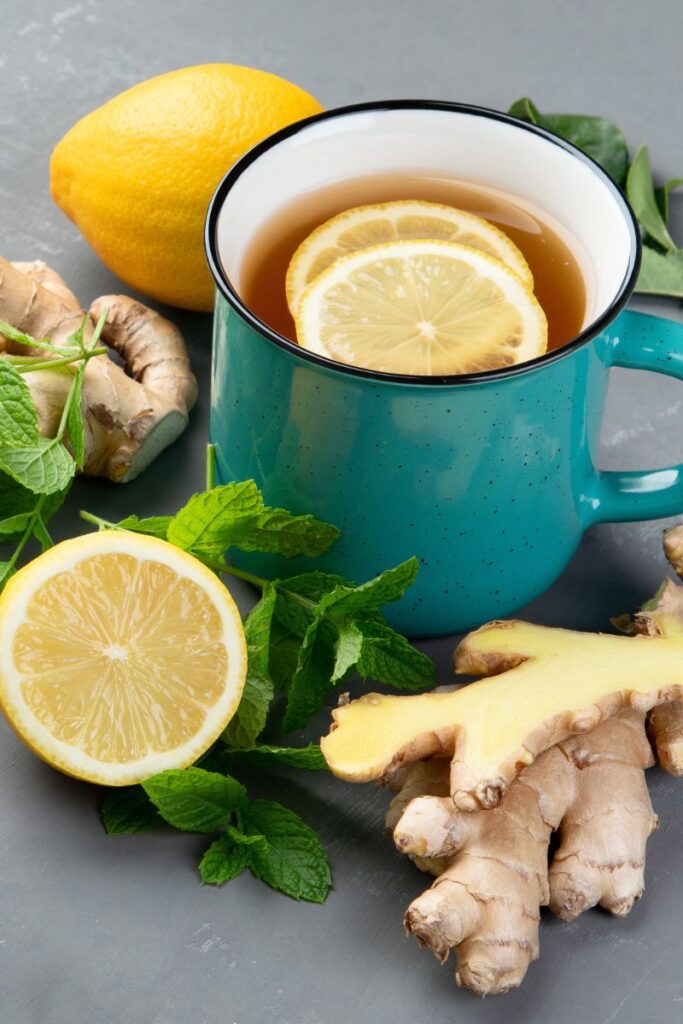
Improving your digestion is a journey towards a happier, healthier you. By exploring the herbal remedies and techniques in this guide, you've taken steps to understand your body better.
From herbal teas to mindful eating, from exercise to stress management, you have many tools to support your digestive health.
Remember to listen to your body, seek advice when needed, and be patient with yourself. Every step brings you closer to better health and balance.




[…] for pregnant women experiencing morning sickness. The gentle yet potent compounds in ginger work to calm the stomach and reduce feelings of queasiness, allowing you to navigate your day with greater […]